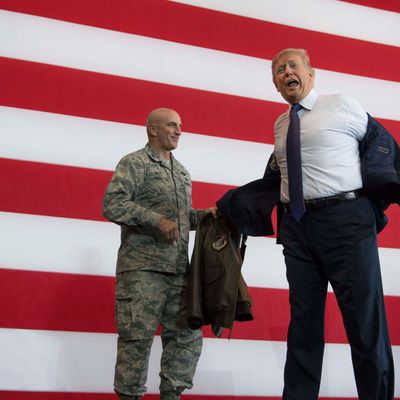
The White House’s request to obscure the U.S.S. John S. McCain during the president’s recent visit to Japan has unfurled into its own case study of norm violations in the Trump administration. When the news broke on Thursday that the White House had asked that the destroyer stay “out of sight” when Trump was in Japan, the Navy initially denied the existence of such a request. But by Saturday, the Navy had acknowledged that the White House urged that it “minimize the visibility” of the vessel named after the father and grandfather of Trump’s foe in the GOP.
Then on Sunday, Acting White House Chief of Staff Mick Mulvaney admitted on Meet the Press that a member of the White House advance team had requested that the destroyer be moved. “The fact some 23- or 24-year-old person went to that site and said, ‘Oh my goodness, there’s the John McCain, we all know how the president feels about the former senator, that’s not the best backdrop, can somebody look into moving it?’ That’s not an unreasonable thing to ask.” Mulvaney added that it would be “silly” for someone to get fired for their role in the posthumous feud, and that Trump’s feelings toward McCain — whom he has called a “dummy” and “not a war hero” — are “well known.”
Normally, this tacit acknowledgment of our toddler president’s behavior would be the end of such an exchange, and the country’s political attention would drift toward the next scandal du jour. But on Sunday, the Pentagon made the unanticipated step of telling the White House to leave the military out of Trump’s political posturing, according to a report from the Associated Press.
Acting Secretary of Defense Patrick Shanahan reportedly told his chief of staff to inform the White House military office on Friday that “the Department of Defense will not be politicized.” According to the AP, Shanahan’s chief of staff “reported back that he delivered the message,” suggesting that the White House might not have been the most receptive audience.
Shanahan is now reportedly considering sending out formal guidelines to military units so that similar problems can be avoided the next time the White House tries to avoid a presidential meltdown. “The goal would be to ensure there is less ambiguity about how the military should support VIP events and how service members should respond to such political requests,” reports the AP.
The message from the Pentagon is a rare public clash between the Department of Defense and the White House, made more unusual by the uncertain job security of Patrick Shanahan, who is still serving as the acting Defense secretary. But to get the president to stop using the military as a political tool might be an uphill battle, considering such past efforts as announcing the travel ban from the Pentagon’s Hall of Heroes and Trump’s abandoned military parade.






























